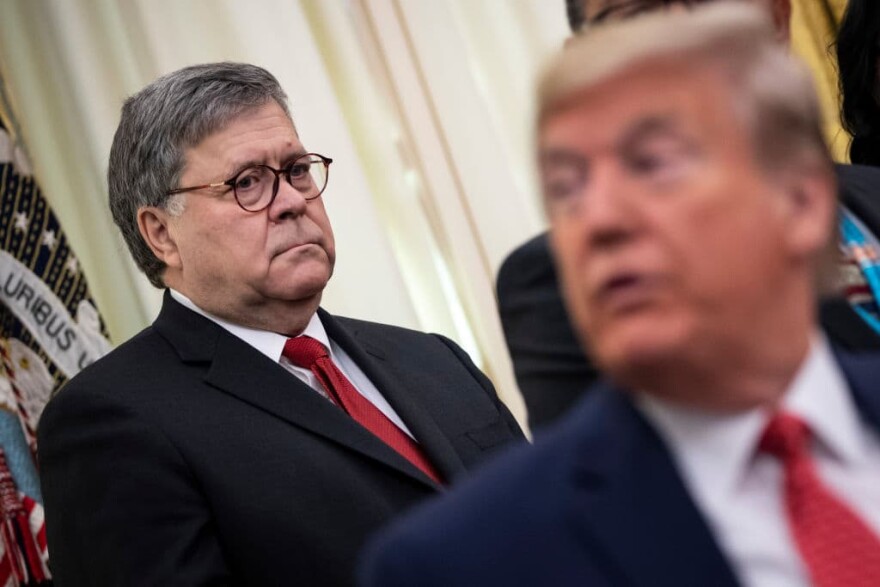The relationship between President Trump and Attorney General William Barr has been the subject of intense scrutiny in the last few weeks.
Barr came under fire after he intervened to change DOJ prosecutors’ sentencing recommendation for Trump associate Roger Stone. His intervention came just hours after Trump tweeted about the sentencing, calling it “horrible and very unfair.”
Lawmakers and media outlets questioned Barr’s independence from Trump. In response, Barr said in an interview with ABC that Trump’s opinionated tweets about the DOJ’s work made it “impossible” to do his job.
To contextualize the Barr/Trump controversy, Fordham University Law School professor Robert Kaczorowski compares the current president and attorney general’s relationship with those of several past pairings.
One such duo was Richard Nixon and his attorney general, John Mitchell. Mitchell was notorious for his allegiance to the president and served 19 months in federal prison for his role in the Watergate scandal.
Kaczorowski also compared Trump’s relationship with Barr to John F. Kennedy and Robert Kennedy, who were closer than most president and AG pairings.
Barr has used the “unitary executive theory” — or the idea that a president has absolute executive privilege — to defend his and Trump’s actions. Kaczorowski notes that this idea has existed throughout several administrations, though it could be considered contrary to the Constitution.
Interview Highlights
On parallels with the relationship between John F. Kennedy and Robert Kennedy
“Bobby Kennedy is an adviser of John Kennedy. And it’s Bobby Kennedy who is the primary motivator in the Kennedy administration’s support for civil rights. And it’s Bobby Kennedy who sends Nicholas Katzenbach, the deputy attorney general, down to Alabama to force the desegregation of the University of Alabama in 1962 or 1963. So there’s a very close connection between the Department of Justice, headed by Bobby Kennedy and John Kennedy, that changes when Kennedy is assassinated and Lyndon Johnson becomes president. Bobby Kennedy and his successor, Nicholas Katzenbach, disliked LBJ and LBJ disliked them. And so they operated more independently of the president than did Bobby Kennedy.”
On parallels with the Nixon and Mitchell relationship
“Now, there is a connection between what Mitchell was doing and what Barr is doing today. The misuse of government agencies to investigate political opponents and so forth in the Nixon administration is very similar to what Barr is doing with the Department of Justice today. In that Barr is using the power of the Department of Justice to benefit the political interests of the president. The difference, however, between what Mitchell was doing and what Barr is doing is that Barr is interfering directly in cases involving friends of the president, as well as preventing evidence from being presented to Congress that reveal President Trump’s wrongdoing. What Barr is doing is truly an abuse of power. It’s unethical and it violates the norms that were established in the post-Watergate era.”
On the impact of Watergate
“As a result of that incident, a number of statutes were enacted by Congress to separate the attorney general’s independence from the control of the president. And one of the important reforms that Congress enacted in 1978 was the Ethics in Government Act, which created the independent counsel, establishing an officer outside of the Department of Justice to investigate wrongdoing within the administration.”
On the unitary executive theory and its constitutionality
“The unitary executive theory is a theory that evolved in the 1980s with conservative Republicans and the Federalist Society. The critical point in the unitary executive theory that’s most problematic is the idea that the president may do whatever the president wants.
“In terms of the case law, the Supreme Court all the way back to Nixon and United States versus Nixon, where President Nixon’s attorney argued that the president has absolute executive privilege. The court rejected that idea. And consistently since then, whenever the president has asserted an unreviewable power, the Supreme Court has rejected it. And the traditions, as well as the law, gives Congress the power of oversight of the executive branch.”
On the limitations of executive power
“It is a fact that the president is the chief law enforcement officer in that, it is Article 2 that delegates to the president the power faithfully to execute the law. However, our principle of separation of powers includes checks and balances. And that principle is as foundational as the idea that we have three branches of government. That’s number one. Number two, there is such a thing as abuse of power, so that, although the president has the power to enforce the laws, he does not have the power to enforce the laws in a way that are immoral, unethical or indeed self-serving, as we see President Trump do today.”
This article was originally published on WBUR.org.
Copyright 2021 NPR. To see more, visit https://www.npr.org. 9(MDExMDQwMzQzMDEzNjMyMTE3MjRkNzlmNg004))


